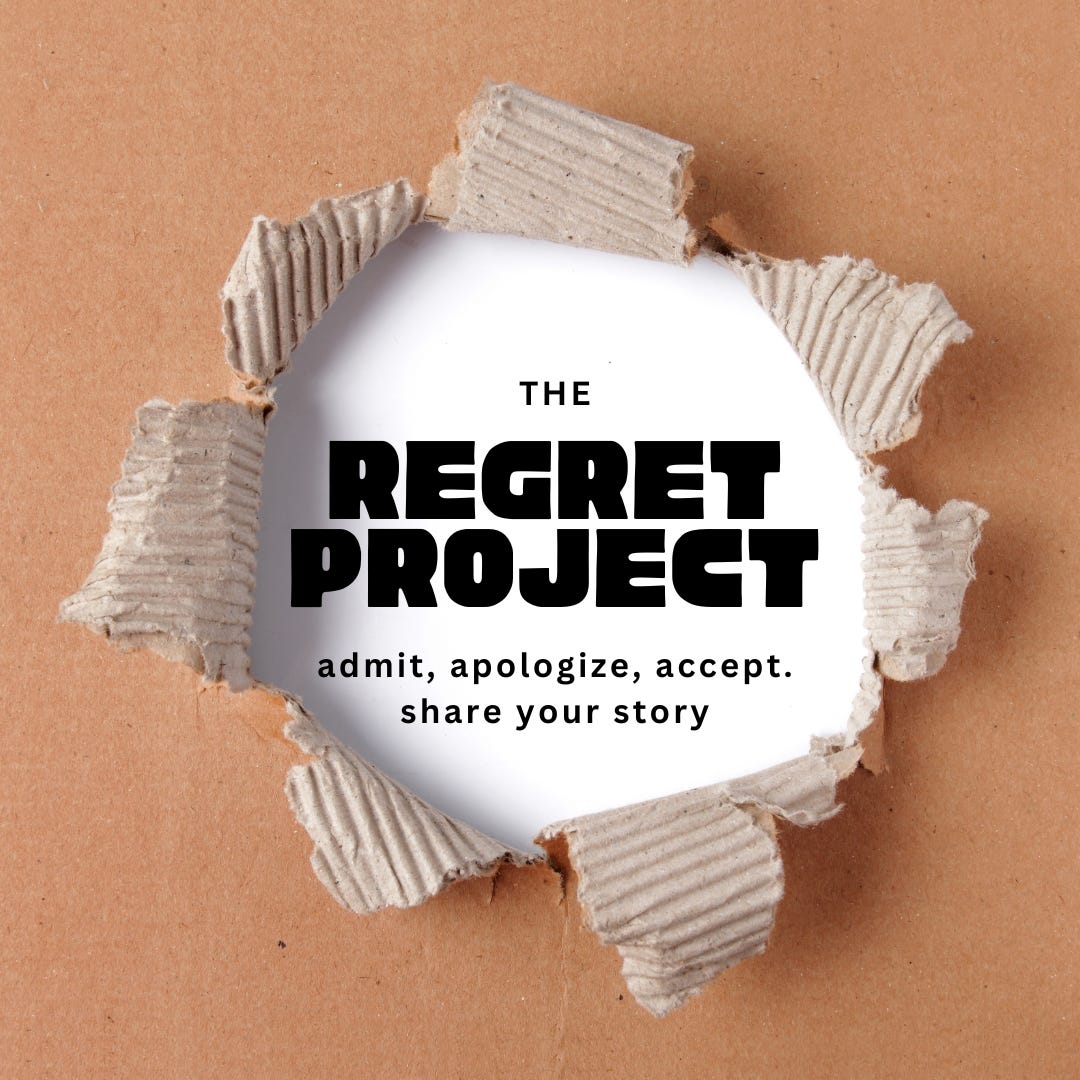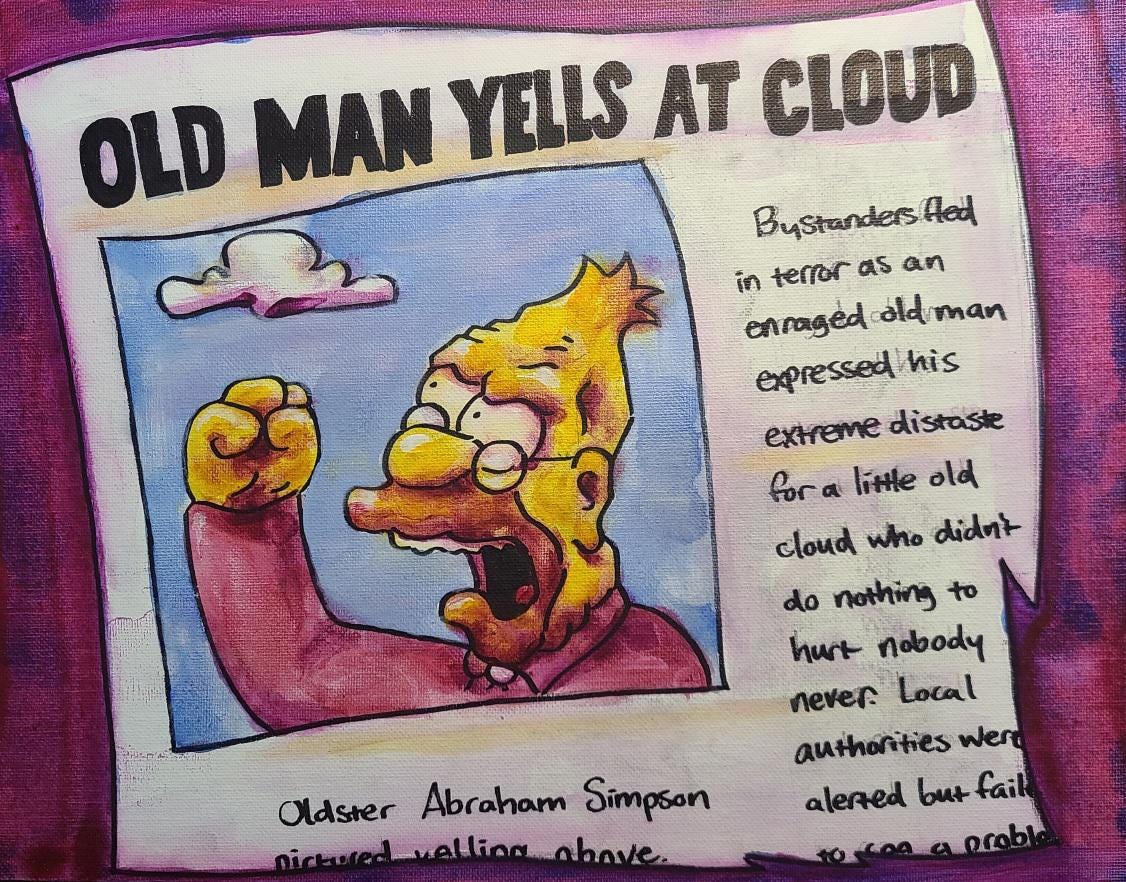The Regret Project
Regret Now (Vol II)
Time to talk about regrets again.
As I mentioned in the first installment of Regret Now, this monthly feature is my space to reflect on regrets, admit when I’ve changed my mind, and apologize when needed. I change my mind on the regular, but consistency seems to get more love; many people see it as a sign of strength and reliability. Maybe that’s why politicians work so hard to avoid admitting they’ve changed their mind. Some evade tough questions; others outright lie.
Take Kamala Harris, for example. When asked about her shift on a fracking ban, instead of saying something like, “I’ve learned more about how this impacts the working-class people of Pennsylvania, and I’ve changed my stance,” she insisted her values had never changed. Why didn’t she just say her thinking on the topic evolved, that she changed her mind? I don’t get it. I would’ve respected her more if she’d owned up to the shift, even if it opened her up to accusations of political opportunism.
Admitting you’re wrong or that your perspective has changed is tough, especially when it feels like the world values unwavering consistency. But to me, it’s a sign of humility and growth. I admire people who change their minds when new information comes to light. People forget that the brain is the biggest erogenous zone. Owning our intellectual growth can be oddly liberating.
I feel regret all the time. Since this Substack has had me stirring the pot so much (do I regret that?), I’m sure I’ll have a regular stream of things to apologize for.
And maybe you do too.
Introducing The Regret Project: a space to share regrets, apologies, or moments where you’ve changed your mind. I want to invite you to submit your stories—big or small—for this project. I’ll publish submissions as part of a recurring feature, and if anonymity makes it easier to open up, I’ve got you covered. This monthly feature is for paid subscribers, but anyone—free subscribers or not—can send in something they want to share. Complete this handy form to send me something anonymously.
Think of this as a mini version of The Apology Project, where New Yorkers were invited in the 1980s to call a random phone number to “apologize their wrongs against people without jeopardizing themselves”. This project was recently featured in a podcast, called The Apology Line, and it revealed that many people called to confess everything from petty misdeeds to, yes, even murder. I’m not expecting anything quite so dramatic. Let’s see this how this experiment goes.
Why do this? Because admitting when we’re wrong can be freeing. It might even help us build a bit more intellectual humility. Sharing our regrets is a way to show growth, to show what we’ve learned, or to confess to having messed up and are trying to improve.
So, what do you say? Be brave. Share your story. Who knows? It might inspire others or even help you make peace with yourself. Maybe no one will send me anything, but I hope a few brave souls do. Submit anonymously. Submit to the Regret Project now!
Now, onto my regrets for the month.
I owe a big apology to some of my friends and colleagues. In my post about drinking, I told the story of how my department stopped doing our post-seminar social after the Equity, Diversity, and Inclusion committee drafted a document detailing how a trip to a pub might not be sufficiently inclusive. While I disagreed with this move, I did not need to bring this internal matter up at all. This comment reflected poorly on my department, particularly the social-personality area, painting it as petty. Nothing could be further from the truth. I feel blessed to be part of the social-personality area at the University of Toronto, which I genuinely believe is one of the best programs in the world. It’s a place where colleagues truly get along. Of course, no department is perfect, but ours is nothing like the dysfunctional, ego-driven environments satirized in novels by authors like Richard Russo. As a group, we like each other, and our area is remarkably drama-free. I hope our students didn’t read those words and think otherwise.
For me to add a couple of sentences throwing my colleagues under the bus and giving the wrong impression was unnecessary, especially since these comments could have been completely removed and the overall post would be unchanged. It was about the merits of drinking after all, not about departmental politics. Clearly, I was angry that our post-seminar social was no longer, but this was not the way to express that anger. I should tattoo this on my forehead: I will do better next time.
That was my biggest regret of the month, but I have a few reflections on some of the other posts and even the name of this Substack.
Yes, I’m having regrets about naming this Substack Speak Now Regret Later. I never fully loved the name even if it does capture something about my personality and spirit. But I also don’t want to push the regret angle too far, to write things that are controversial for the sake of being controversial. While I want to be free to speak my mind, I also don’t need to engage in regret-farming. I don’t think I’m doing that, but still. The other name my editor Jane Warren recommended was The Contrarian and I kind of like a variant of that, Contrarian Science or The Contrarian Scientist. This still pigeonholes me, and I don’t only write about science, but it's growing on me. I know, I know. I’m not supposed to change my “brand,” but like I said at the top, I change my mind constantly. I haven’t decided to change just yet, but if you had opinions about the current name or possible name change, please message me or comment below. And just in case you’re worried, I will keep this Regret Now feature going even if I change the name of the Substack. I am really enjoying speaking more loosely and frankly with you, dear reader. And, hopefully, a few of you will be brave enough to share a regret or apology that I can publish here. For now, at least, the name remains.
Some other regrets and reflection
I thought a lot about my post about lawn signs before writing it. I stand by the general sentiment. That said, I also realize I’m coming across as a grumpy old man yelling at clouds again. I can get cranky sometimes, and with that post, I leaned into it. But let me be clear: I’m not suggesting that political lawn signs should be banned, as one commenter implied. Far from it. What I’m advocating for is a shift in how we view them—not as commendable allyship but as something a bit rude and unneighborly. We don’t legislate against cutting in line or chewing with your mouth open, but we still frown on those behaviors. In the same way, I’m proposing we adopt a new norm: politics-free lawns, a small step toward fostering civility and neighborly goodwill in our communities.
No regrets here, but I had hoped that my post (and research) about digital viewing habits and boredom would have generated more interest and discussion here on Substack. I thought more people would have liked that post given the overwhelming amount of attention that research has received in the mainstream media. At the time I published it, that research had already received positive media attention from places like CNN, NPR, the Guardian, and since I published it, it received attention from The Times and Fox News. Apparently, the only place it failed to go viral is…my own Substack. Maybe next time I’ll try a cat video.
I want to give a shoutout to the four winners of my spot the Big Lebowski references contest. The Little Urban Achievers are: Daniel, DaMcT, Jannie, and Cristina Getson. Thanks for playing along. I also declared West Coast Ryan a winner because he made me laugh. The winners were each gifted with a 3-month paid subscription, what everyone is begging for this holiday season! Three of the four Lebowski references were super easy, so I’ll insert more subtle ones in the future. Anyone spot the ones here?
I was going to add one last entry, again not a regret but more like me doubling down. But this post is getting too long and perhaps I’ll save it for next time. But know that it is about a back-and-forth I had with my good friend Paul Bloom on his Substack, Small Potatoes. The back and forth is about AI, empathy, and reality. Read Paul’s post, but also the post of mine (co-written with my longtime collaborator, Daryl Cameron) that Paul is responding to. I agree with many parts of Paul’s response, but I also felt he missed the mark too.
Maybe I’ll write about in a future installment of Regret Now. Till then, bye bye!




Hi Mickey, your wife here. I really appreciate this aspect of your substack as it truly represents who you are at your core. You’re someone who is internally strong enough to admit your own mistakes and apologize for them. It deepens your relationships and models for others that it’s ok to do the same. And it makes you very lovable. I’m very proud of you.
Hey Mickey,
I think this is a good idea. It’s easy to get audience capture (the real erogenous zone) from ranting, but probably not as likely from confessing, indeed, far from it!
That said, I think both aspects are healthy together. There’s a great line in P&P: “What are we here for, but to laugh at our neighbours, and make sport for them in turn”. I think it is fair to be annoyed, it’s what we do after that counts.
I have felt a similar experience back when I was in university about a DEI like recommendation to avoid campus pubs as for discussion group meetings. At the time I was chapped, because i thought that the less formal atmosphere can stimulate creativity and indeed even be helpful for some persons who may otherwise be shy (myself). Since, I’ve been a bit convinced of the positives to nuance in discussions about alcohol by Ted Slingerland. I think it is some kind of eastern thing. My support has increased in time for a few reasons, the more because of having gone through so many changes to that relationship throughout career: workshops and conferences during grad school, working under during covid (when it was frowned upon), working with First Nation (where it was understandably taboo). But recently, I’ve joined a new department and once a month we leave an hour early mid week to discuss a selected research paper and it’s great.
I think it’s fair to rant, that said, if it’s about your own department it is probably best to rant about your dirty laundry in a tone that’s less aggravating than get of my lawn of yard signs. It’s tricky, but I think it’s important that we speak up and occasionally make mistakes (and own them) than to not risk making the mistakes. Life is strikes and gutter, ups and downs.
Anyways, thanks. And don’t mind the longer post. Not everyone is into the whole brevity thing.
The dude abides.
Cheers,